外研版(2019)必修 第二册Unit 1 Food for thought Understanding ideas 语言点 课件 (共32张PPT)
文档属性
| 名称 | 外研版(2019)必修 第二册Unit 1 Food for thought Understanding ideas 语言点 课件 (共32张PPT) |  | |
| 格式 | pptx | ||
| 文件大小 | 2.0MB | ||
| 资源类型 | 教案 | ||
| 版本资源 | 外研版(2019) | ||
| 科目 | 英语 | ||
| 更新时间 | 2024-10-29 10:09:02 | ||
图片预览

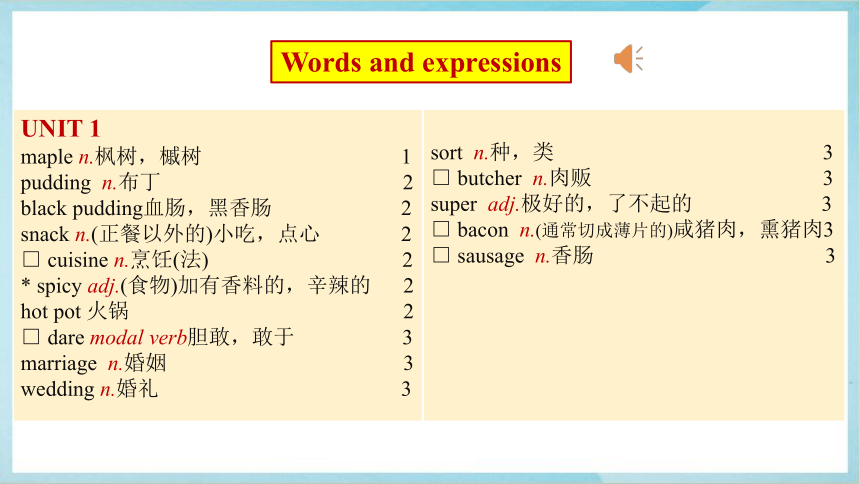
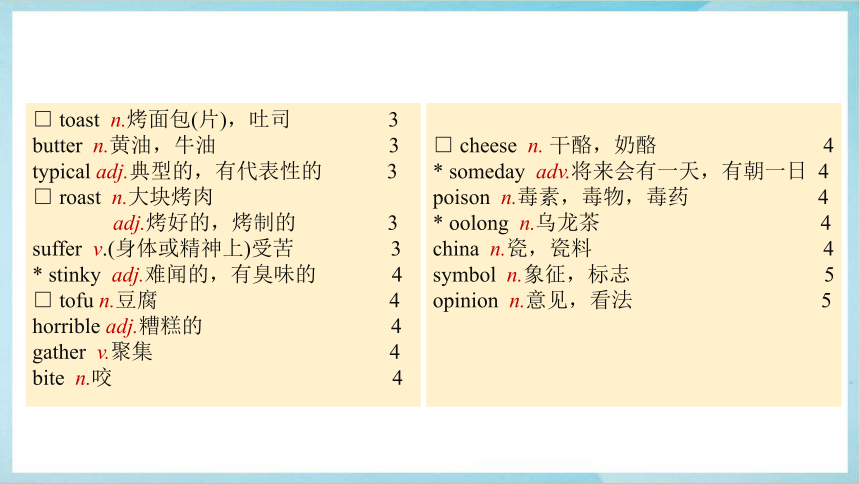

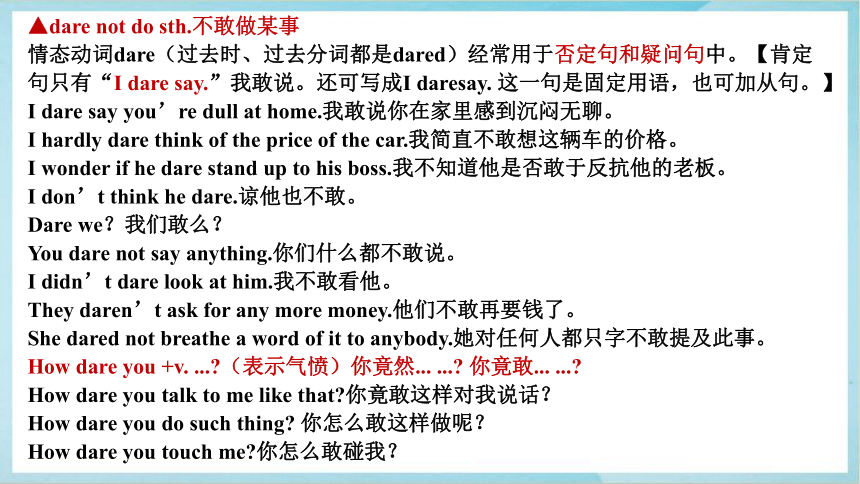
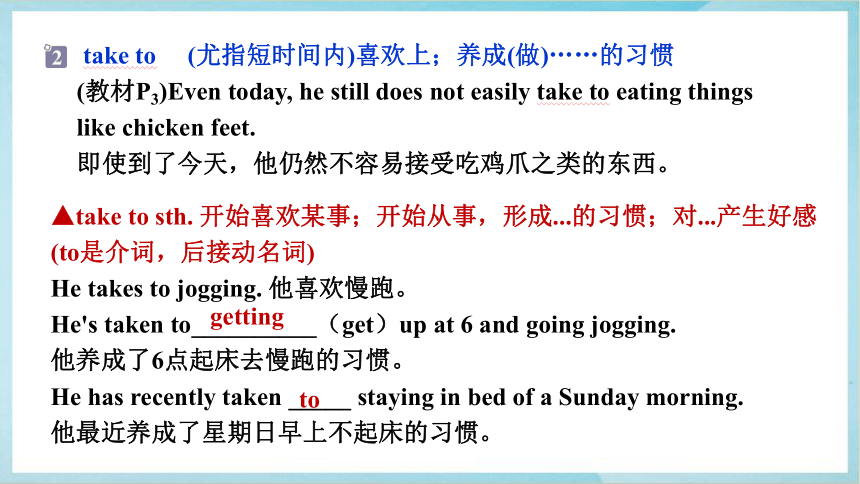

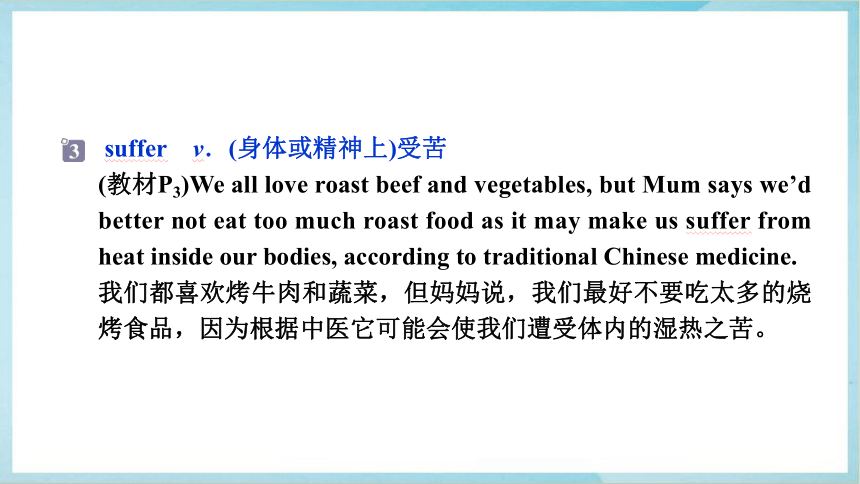
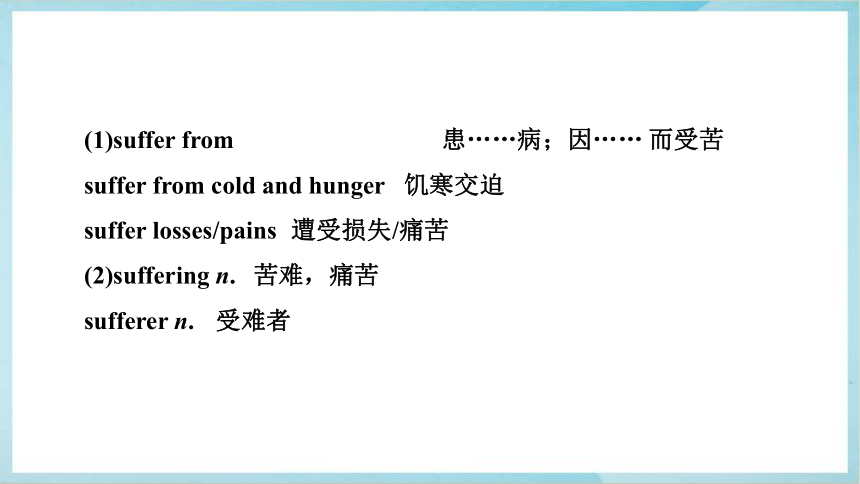
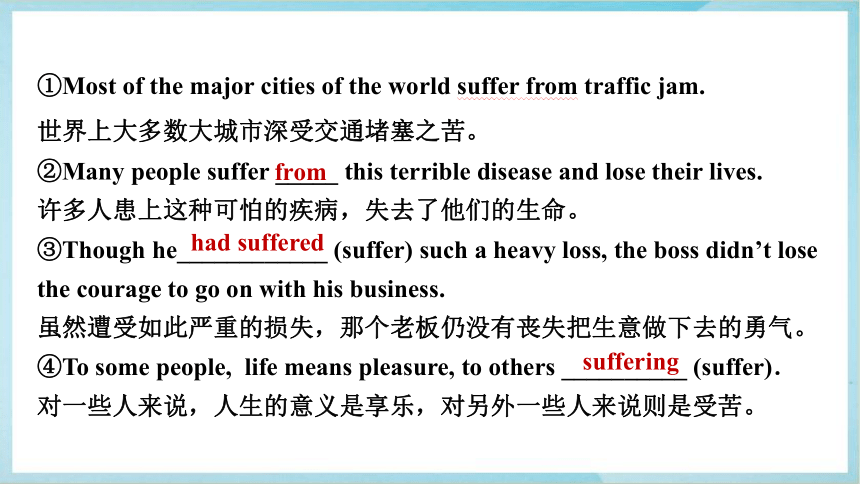
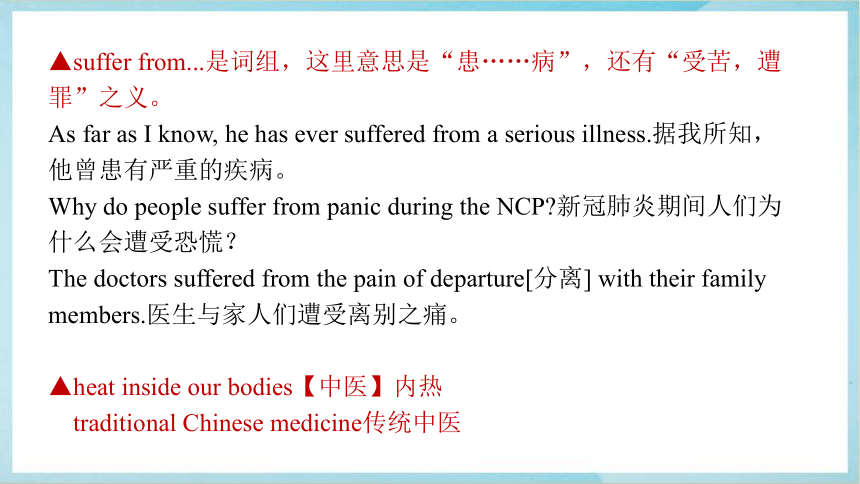
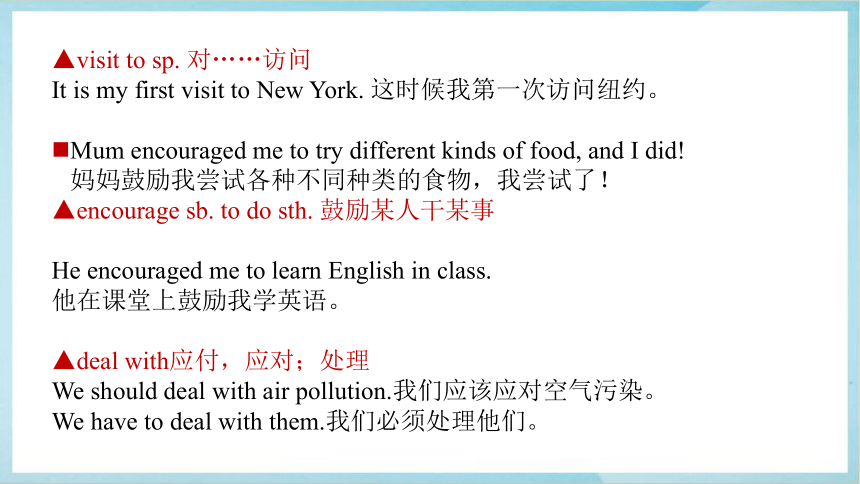
文档简介
(共32张PPT)
Unit 1 Understanding ideas
A Child of Two Cuisines
享受跨国美食的孩子
语言点课件
Words and expressions
UNIT 1
maple n.枫树,槭树 1
pudding n.布丁 2
black pudding血肠,黑香肠 2
snack n.(正餐以外的)小吃,点心 2
□ cuisine n.烹饪(法) 2
* spicy adj.(食物)加有香料的,辛辣的 2
hot pot 火锅 2
□ dare modal verb胆敢,敢于 3
marriage n.婚姻 3
wedding n.婚礼 3
sort n.种,类 3
□ butcher n.肉贩 3
super adj.极好的,了不起的 3
□ bacon n.(通常切成薄片的)咸猪肉,熏猪肉3
□ sausage n.香肠 3
□ cheese n. 干酪,奶酪 4
* someday adv.将来会有一天,有朝一日 4
poison n.毒素,毒物,毒药 4
* oolong n.乌龙茶 4
china n.瓷,瓷料 4
symbol n.象征,标志 5
opinion n.意见,看法 5
□ toast n.烤面包(片),吐司 3
butter n.黄油,牛油 3
typical adj.典型的,有代表性的 3
□ roast n.大块烤肉
adj.烤好的,烤制的 3
suffer v.(身体或精神上)受苦 3
* stinky adj.难闻的,有臭味的 4
□ tofu n.豆腐 4
horrible adj.糟糕的 4
gather v.聚集 4
bite n.咬 4
单元知识要点
▲thanks to...多亏了,由于,幸亏
Thanks to these donations, the patients are receiving the best medicines.由于这些捐赠,这些患者得到了这些最好的药品。
But now, thanks to technology, more and more small businesses are finding customers and competitors all over the globe.但如今,由于技术的发展,越来越多的小型企业正在全球范围内寻找消费者和竞争者。
thanks to 幸亏;由于;因为
(教材P2)Thanks to this, Dad has come to love hot pot!
多亏了这个,爸爸才渐渐喜欢上了火锅!
▲dare not do sth.不敢做某事
情态动词dare(过去时、过去分词都是dared)经常用于否定句和疑问句中。【肯定句只有“I dare say.”我敢说。还可写成I daresay. 这一句是固定用语,也可加从句。】
I dare say you’re dull at home.我敢说你在家里感到沉闷无聊。
I hardly dare think of the price of the car.我简直不敢想这辆车的价格。
I wonder if he dare stand up to his boss.我不知道他是否敢于反抗他的老板。
I don’t think he dare.谅他也不敢。
Dare we?我们敢么?
You dare not say anything.你们什么都不敢说。
I didn’t dare look at him.我不敢看他。
They daren’t ask for any more money.他们不敢再要钱了。
She dared not breathe a word of it to anybody.她对任何人都只字不敢提及此事。
How dare you +v. ... (表示气愤)你竟然... ... 你竟敢... ...
How dare you talk to me like that 你竟敢这样对我说话?
How dare you do such thing 你怎么敢这样做呢?
How dare you touch me 你怎么敢碰我?
▲take to sth. 开始喜欢某事;开始从事,形成...的习惯;对...产生好感(to是介词,后接动名词)
He takes to jogging. 他喜欢慢跑。
He's taken to__________(get)up at 6 and going jogging.
他养成了6点起床去慢跑的习惯。
He has recently taken _____ staying in bed of a Sunday morning.
他最近养成了星期日早上不起床的习惯。
getting
to
take to (尤指短时间内)喜欢上;养成(做)……的习惯
(教材P3)Even today, he still does not easily take to eating things like chicken feet.
即使到了今天,他仍然不容易接受吃鸡爪之类的东西。
He also does a typical Sunday roast.
( 教材P3) 他也做典型的周日烤肉。
▲typical, adj. 典型的,特有的 typically adv.典型地;通常
比较级more typical最高级most typical . 如:
The question is small but typical.问题虽小,但很典型。
▲be typical of sb./sth. 典型的,特有的,是...的特点
It was typical of her to forget.
她这人就是爱忘事。
This meal is typical of local cookery.
这是有当地风味的饭菜。
She threw her hands into the air. “That is just typical of you, isn’t it ”她往空中挥挥双手说, “你一贯就是这个样子,是不是?”
suffer v.(身体或精神上)受苦
(教材P3)We all love roast beef and vegetables, but Mum says we’d better not eat too much roast food as it may make us suffer from heat inside our bodies, according to traditional Chinese medicine.
我们都喜欢烤牛肉和蔬菜,但妈妈说,我们最好不要吃太多的烧烤食品,因为根据中医它可能会使我们遭受体内的湿热之苦。
(1)suffer from 患……病;因…… 而受苦
suffer from cold and hunger 饥寒交迫
suffer losses/pains 遭受损失/痛苦
(2)suffering n. 苦难,痛苦
sufferer n. 受难者
①Most of the major cities of the world suffer from traffic jam.
世界上大多数大城市深受交通堵塞之苦。
②Many people suffer _____ this terrible disease and lose their lives.
许多人患上这种可怕的疾病,失去了他们的生命。
③Though he____________ (suffer) such a heavy loss, the boss didn’t lose the courage to go on with his business.
虽然遭受如此严重的损失,那个老板仍没有丧失把生意做下去的勇气。
④To some people, life means pleasure, to others __________ (suffer).
对一些人来说,人生的意义是享乐,对另外一些人来说则是受苦。
from
had suffered
suffering
▲suffer from...是词组,这里意思是“患……病”,还有“受苦,遭罪”之义。
As far as I know, he has ever suffered from a serious illness.据我所知,他曾患有严重的疾病。
Why do people suffer from panic during the NCP 新冠肺炎期间人们为什么会遭受恐慌?
The doctors suffered from the pain of departure[分离] with their family members.医生与家人们遭受离别之痛。
▲heat inside our bodies【中医】内热
traditional Chinese medicine传统中医
▲visit to sp. 对……访问
It is my first visit to New York. 这时候我第一次访问纽约。
Mum encouraged me to try different kinds of food, and I did!
妈妈鼓励我尝试各种不同种类的食物,我尝试了!
▲encourage sb. to do sth. 鼓励某人干某事
He encouraged me to learn English in class.
他在课堂上鼓励我学英语。
▲deal with应付,应对;处理
We should deal with air pollution.我们应该应对空气污染。
We have to deal with them.我们必须处理他们。
I came across this old photograph when looking for a book yesterday.
我昨天在寻找一本书时偶然发现了这张老照片。
when it comes to... 涉及…… ; 谈到……
例如:当谈到因特网时,他总是很兴奋。
____________________ the Internet, he is always very excited.
When it comes to
come across (偶然)遇见;碰见
(教材P3)But just when I thought I could deal with all Chinese food, I came across stinky tofu, a horrible grey thing that looked and smelt like a burnt sports shoe.
但就在我以为我能应付所有中国菜的时候,我遇到了臭豆腐,一种可怕的灰色东西,看起来和闻起来像一只烧焦的运动鞋。
▲gather one’s courage to do sth.鼓足勇气干某事
He gathered his courage to ask his teacher a problem.
他鼓足勇气问了老师一个难题。
▲take a bite咬了一口;吃了一口
I can’t wait to take a bite of the bread. It smells so delicious.
我迫不及待地咬了一口面包。它闻起来好香啊。
amazed adj.感到惊奇的;吃惊的
(教材P3)...I gathered all my courage to take a bite and was amazed to find it wasn’t so bad.
……我鼓足勇气咬了一口,惊奇地发现它没那么糟。
(1)be amazed at/by 对……很惊奇
be amazed to do sth. 对做某事感到惊奇
(2)amaze vt. 使吃惊
amazing adj. 令人吃惊的;令人惊讶的
(3)amazement n. 惊讶
(much) to one’s amazement 令某人(非常)惊讶的是
①The amazed look on her face showed that she was amazed to hear that Mary had won the first prize.
她脸上惊讶的表情表明听说玛丽得了第一名她感到很惊讶。
②Believe it or not, what he said _________ (amaze) me greatly.
信不信由你,他所说的话使我大为震惊。
③It was _________ (amaze) that he should have survived the big fire.
他竟然在大火中幸免于难,真是令人感到惊奇。
④To his ___________, we were not ________ at his _________ achievements. (amaze)
让他吃惊的是,他的令人吃惊的成就并没有使我们吃惊。
amazed
amazed
amazing
amazing
amazement
remind sb. of... 使某人想起……
(教材P3)It reminded me of blue cheese, a similarly strong smelling type of food you either love or hate.
它让我想起了蓝奶酪,一种你爱或恨的同样强烈味道的食物。
(1)remind vt. 提醒;使想起
remind sb. that... 使某人想起……
remind sb. to do sth. 提醒某人做某事
(2)reminder n. 提醒者
①At first, I would like to remind you that smoking is not allowed here.
首先,我想提醒大家注意的是,这里不准抽烟。
②“Have a nice day” is a wonderful phrase, reminding us, in effect, _________ (enjoy) the moment.
“祝你愉快”是个美妙的词语,实际上它在提醒我们要享受时光。
▲remind sb.of sth. 使某人想起某事/物;提醒某人某事
reminder n. 提醒的人或物;提醒;提示
Our teacher often reminds me of doing my homework.我们老师经常提醒我们做作业。
to enjoy
▲either... or... 要么……要么……
I am considering living in either New York or Hong Kong.我在考虑要么住在纽约要么住在香港。
▲ fall in love with sb./sth. 喜欢(爱)上某人或某物【表动作】
be in love with sb./sth. 喜欢(爱)上某人或某物【表状态】
If someone loves none, he may fall in love with anyone around him.
当一个人谁都不爱的时候,他就可能爱上身边的任何一个人。
He has been in love with the girl for two years.
他和这女孩相恋有两年了。
▲feel at home在家中般轻松自在;感觉自在;感到宾至如归
I feel at home living here.
住在这里我感觉像在家里一样。
I really feel at home on stage.
我在舞台上感觉非常自在。
I feel at home together with you. I feel very happy as if I become much younger.
我跟你们在一起感到无拘无束,觉得特别开心,仿佛我也年轻了许多。
We can make you feel at home.
我们会让您有一种宾至如归的感觉。
句型精析
句型 1
否定词与比较级连用,表示最高级含义
(教材P3)To me, there’s nothing better than a cross cultural afternoon tea of English biscuits and a cup of Chinese oolong tea in a fine china cup!
对我来说,没有什么比一杯跨文化的英式饼干下午茶和一瓷杯乌龙茶更好的了!
本句中否定词nothing与比较级better连用,表示最高级含义。表示最高级含义的几种特殊结构:
(1)否定词+比较级,“没有比……更……;没有像……一样……”,常用的否定词有no, not, never, nothing, nobody, hardly等。
(2)can/could+never/not...enough/too...再……也不过分。
①—What do you think of the 2019 military parade of National Day
——你觉得2019年国庆阅兵式怎么样?
—It couldn’t be better.
——再好不过了。
②I have never seen a_________ (good) film before.
我以前从未看过比这更好的电影。
③You can’t be_________ careful while driving a car, for accidents happen frequently.
你驾车时再小心也不过分,因为交通事故经常发生。
better
too
在病人看来,没有什么比身体健康更重要。
From the patient’s point of view, ___________________________ keeping healthy.
没有什么比健康更总要的了,不是吗?
________________________________________ good health, is there
--- 你似乎很高兴。
--- 当然了。没有什么比看到你的名字被印出来更令人高兴的了。
--- You seem to be on top of the world.
--- Of course. _____________________________________ seeing your name in print.
nothing is more important than
There's nothing more important than
There's nothing more exciting than
1.
2.
3.
[巧学活用]——完成句子
▲nothing better than... 没有什么比……更好的了;最好莫过于……;
没有比……好的
There is nothing better than wisdom.
世上没有比智慧更好的东西了。
I can think of nothing better than a nice cold beer on a hot summer afternoon.
在夏季炎热的下午,我想不出什么比一杯冰凉可口的啤酒更好的了。
There’s nothing better than a massive piece of pork for breakfast.
没有什么比用大块猪肉做早餐来的痛快。
句型 2
He must have thought I was joking. (教材P3) 他一定以为我在开玩笑。
这是“must + have +过去分词” 构成的情态动词完成时,表示对过去发生情况的推测,意思是“一定”,“必定”,“想必”,“肯定是”。
▲“must + have + 过去分词”结构值得重视,它表示对过去所发生的事情的肯定推测。
否定推测用:can’t或者couldn’t + have + 过去分词 。
举例说明:
I didn’t hear the phone. I must have been asleep.
我没听到电话响。我一定是睡着了。
当然,can, could, may, might也都可用于肯定句,只是肯定程度依次减弱(can, could也强不过must, must最强!)
Tom isn’t in the classroom. He may/might/could have gone to the library. 汤姆没在教室里,他可能去图书馆了。
同样,对过去所发生情况的否定推测也可用“can’t/couldn’t/may not/might not(也是依次减弱) + have + 过去分词” ,只是“can’t或者couldn’t + have + 过去分词” 最常用! 例如:
The room couldn’t have been cleaned by Li Ming.
这房间不可能是李明打扫的。
He may not have received my letter.
他可能没有收到我的信。
以上这些都是对过去所发生事情的肯定或者否定推测,一般都可加过去的时间状语,如:yesterday,last night,two hours ago等。
肯定推测的反意疑问句通常用“hasn’t/ haven’t + 主语?”,【尤其有表过去时间的状语】 , 也可以用“didn’t + 主语?” 【这时一般有表过去时间的状语】 。如:
He must have been to New York, hasn’t he
他一定去过纽约了,是吗?
They must have succeeded in the experiment last week, didn’t they
他们上星期实验一定成功了,是吗?
▲对过去所发生的事情的否定推测,如果构成反意疑问句,通常用“may not /might not + 主语?”例如:
It may have been in your mind, may not it
它可能留在你的记忆中,是吗?
He might have heard from Tom, mightn’t he
他可能从汤姆那儿听说了此事,对吗?
【这里用mightn’t还是might not均可】
句型 3
People say that one man's meat is another man's poison, but I feel at home with food from both my cultures. (教材P3) 人们说一个人的美食可能是另一个人的毒药,但我对来自两种文化的食物都感到非常舒服。
People say that... (=It is said that...) 据说,人们常说...
sb./sth. is said to do...据说某人/某物……
sb./sth. is said to be doing...据说某人/某物正在……
sb./sth.is said to have done...据说某人/某物做了……
It is said that he is rich.(或He is said to be rich.) (=They said that... =People say that...)据说他很富有。
It is said that about 30,000 people attended this first exhibition.
据说有3万人参加了这次首展。
It is said that...句型常与be said to互换。
It is said that he is an artist.(=He is said to be an artist.)
据说他是个艺术家。
It+be+过去分词+that...
It is agreed that...人们认为……
It is announced that..据宣布……
It is believed that...人们相信……
It is considered that..人们认为……
It is hoped that...人们希望……
It is reported that...据报道……
It is recorded that...据记载……
It is suggested that...有人建议……
It is thought that...人们认为……
以上句型中it 为形式主语,that从句是真正的主语,that不能省略
1. thanks to
2. dare not do sth.
3. take to sth.
4. be typical of sb./sth.
5. suffer from
6. visit to sp.
7. encourage sb. to do sth.
8. deal with
9. gather one’s courage to do sth.
10. take a bite
11. remind sb.of sth.
12. fall in love with sb./sth.
13. feel at home
14. nothing better than...
多亏了,由于,幸亏
开始喜欢某事;开始从事,形成……的习惯
典型的,特有的,……的特点
患……病;受苦,遭罪
对……访问
鼓励某人干某事
应付,应对;处理
鼓足勇气干某事
咬了一口;吃了一口
使某人想起某事/物;提醒某人某事
喜欢(爱)上某人或某物
不敢做某事
复习回顾
在家中般轻松自在;感觉自在;宾至如归
没有什么比……更好的了;最好莫过于……
Unit 1 Understanding ideas
A Child of Two Cuisines
享受跨国美食的孩子
语言点课件
Words and expressions
UNIT 1
maple n.枫树,槭树 1
pudding n.布丁 2
black pudding血肠,黑香肠 2
snack n.(正餐以外的)小吃,点心 2
□ cuisine n.烹饪(法) 2
* spicy adj.(食物)加有香料的,辛辣的 2
hot pot 火锅 2
□ dare modal verb胆敢,敢于 3
marriage n.婚姻 3
wedding n.婚礼 3
sort n.种,类 3
□ butcher n.肉贩 3
super adj.极好的,了不起的 3
□ bacon n.(通常切成薄片的)咸猪肉,熏猪肉3
□ sausage n.香肠 3
□ cheese n. 干酪,奶酪 4
* someday adv.将来会有一天,有朝一日 4
poison n.毒素,毒物,毒药 4
* oolong n.乌龙茶 4
china n.瓷,瓷料 4
symbol n.象征,标志 5
opinion n.意见,看法 5
□ toast n.烤面包(片),吐司 3
butter n.黄油,牛油 3
typical adj.典型的,有代表性的 3
□ roast n.大块烤肉
adj.烤好的,烤制的 3
suffer v.(身体或精神上)受苦 3
* stinky adj.难闻的,有臭味的 4
□ tofu n.豆腐 4
horrible adj.糟糕的 4
gather v.聚集 4
bite n.咬 4
单元知识要点
▲thanks to...多亏了,由于,幸亏
Thanks to these donations, the patients are receiving the best medicines.由于这些捐赠,这些患者得到了这些最好的药品。
But now, thanks to technology, more and more small businesses are finding customers and competitors all over the globe.但如今,由于技术的发展,越来越多的小型企业正在全球范围内寻找消费者和竞争者。
thanks to 幸亏;由于;因为
(教材P2)Thanks to this, Dad has come to love hot pot!
多亏了这个,爸爸才渐渐喜欢上了火锅!
▲dare not do sth.不敢做某事
情态动词dare(过去时、过去分词都是dared)经常用于否定句和疑问句中。【肯定句只有“I dare say.”我敢说。还可写成I daresay. 这一句是固定用语,也可加从句。】
I dare say you’re dull at home.我敢说你在家里感到沉闷无聊。
I hardly dare think of the price of the car.我简直不敢想这辆车的价格。
I wonder if he dare stand up to his boss.我不知道他是否敢于反抗他的老板。
I don’t think he dare.谅他也不敢。
Dare we?我们敢么?
You dare not say anything.你们什么都不敢说。
I didn’t dare look at him.我不敢看他。
They daren’t ask for any more money.他们不敢再要钱了。
She dared not breathe a word of it to anybody.她对任何人都只字不敢提及此事。
How dare you +v. ... (表示气愤)你竟然... ... 你竟敢... ...
How dare you talk to me like that 你竟敢这样对我说话?
How dare you do such thing 你怎么敢这样做呢?
How dare you touch me 你怎么敢碰我?
▲take to sth. 开始喜欢某事;开始从事,形成...的习惯;对...产生好感(to是介词,后接动名词)
He takes to jogging. 他喜欢慢跑。
He's taken to__________(get)up at 6 and going jogging.
他养成了6点起床去慢跑的习惯。
He has recently taken _____ staying in bed of a Sunday morning.
他最近养成了星期日早上不起床的习惯。
getting
to
take to (尤指短时间内)喜欢上;养成(做)……的习惯
(教材P3)Even today, he still does not easily take to eating things like chicken feet.
即使到了今天,他仍然不容易接受吃鸡爪之类的东西。
He also does a typical Sunday roast.
( 教材P3) 他也做典型的周日烤肉。
▲typical, adj. 典型的,特有的 typically adv.典型地;通常
比较级more typical最高级most typical . 如:
The question is small but typical.问题虽小,但很典型。
▲be typical of sb./sth. 典型的,特有的,是...的特点
It was typical of her to forget.
她这人就是爱忘事。
This meal is typical of local cookery.
这是有当地风味的饭菜。
She threw her hands into the air. “That is just typical of you, isn’t it ”她往空中挥挥双手说, “你一贯就是这个样子,是不是?”
suffer v.(身体或精神上)受苦
(教材P3)We all love roast beef and vegetables, but Mum says we’d better not eat too much roast food as it may make us suffer from heat inside our bodies, according to traditional Chinese medicine.
我们都喜欢烤牛肉和蔬菜,但妈妈说,我们最好不要吃太多的烧烤食品,因为根据中医它可能会使我们遭受体内的湿热之苦。
(1)suffer from 患……病;因…… 而受苦
suffer from cold and hunger 饥寒交迫
suffer losses/pains 遭受损失/痛苦
(2)suffering n. 苦难,痛苦
sufferer n. 受难者
①Most of the major cities of the world suffer from traffic jam.
世界上大多数大城市深受交通堵塞之苦。
②Many people suffer _____ this terrible disease and lose their lives.
许多人患上这种可怕的疾病,失去了他们的生命。
③Though he____________ (suffer) such a heavy loss, the boss didn’t lose the courage to go on with his business.
虽然遭受如此严重的损失,那个老板仍没有丧失把生意做下去的勇气。
④To some people, life means pleasure, to others __________ (suffer).
对一些人来说,人生的意义是享乐,对另外一些人来说则是受苦。
from
had suffered
suffering
▲suffer from...是词组,这里意思是“患……病”,还有“受苦,遭罪”之义。
As far as I know, he has ever suffered from a serious illness.据我所知,他曾患有严重的疾病。
Why do people suffer from panic during the NCP 新冠肺炎期间人们为什么会遭受恐慌?
The doctors suffered from the pain of departure[分离] with their family members.医生与家人们遭受离别之痛。
▲heat inside our bodies【中医】内热
traditional Chinese medicine传统中医
▲visit to sp. 对……访问
It is my first visit to New York. 这时候我第一次访问纽约。
Mum encouraged me to try different kinds of food, and I did!
妈妈鼓励我尝试各种不同种类的食物,我尝试了!
▲encourage sb. to do sth. 鼓励某人干某事
He encouraged me to learn English in class.
他在课堂上鼓励我学英语。
▲deal with应付,应对;处理
We should deal with air pollution.我们应该应对空气污染。
We have to deal with them.我们必须处理他们。
I came across this old photograph when looking for a book yesterday.
我昨天在寻找一本书时偶然发现了这张老照片。
when it comes to... 涉及…… ; 谈到……
例如:当谈到因特网时,他总是很兴奋。
____________________ the Internet, he is always very excited.
When it comes to
come across (偶然)遇见;碰见
(教材P3)But just when I thought I could deal with all Chinese food, I came across stinky tofu, a horrible grey thing that looked and smelt like a burnt sports shoe.
但就在我以为我能应付所有中国菜的时候,我遇到了臭豆腐,一种可怕的灰色东西,看起来和闻起来像一只烧焦的运动鞋。
▲gather one’s courage to do sth.鼓足勇气干某事
He gathered his courage to ask his teacher a problem.
他鼓足勇气问了老师一个难题。
▲take a bite咬了一口;吃了一口
I can’t wait to take a bite of the bread. It smells so delicious.
我迫不及待地咬了一口面包。它闻起来好香啊。
amazed adj.感到惊奇的;吃惊的
(教材P3)...I gathered all my courage to take a bite and was amazed to find it wasn’t so bad.
……我鼓足勇气咬了一口,惊奇地发现它没那么糟。
(1)be amazed at/by 对……很惊奇
be amazed to do sth. 对做某事感到惊奇
(2)amaze vt. 使吃惊
amazing adj. 令人吃惊的;令人惊讶的
(3)amazement n. 惊讶
(much) to one’s amazement 令某人(非常)惊讶的是
①The amazed look on her face showed that she was amazed to hear that Mary had won the first prize.
她脸上惊讶的表情表明听说玛丽得了第一名她感到很惊讶。
②Believe it or not, what he said _________ (amaze) me greatly.
信不信由你,他所说的话使我大为震惊。
③It was _________ (amaze) that he should have survived the big fire.
他竟然在大火中幸免于难,真是令人感到惊奇。
④To his ___________, we were not ________ at his _________ achievements. (amaze)
让他吃惊的是,他的令人吃惊的成就并没有使我们吃惊。
amazed
amazed
amazing
amazing
amazement
remind sb. of... 使某人想起……
(教材P3)It reminded me of blue cheese, a similarly strong smelling type of food you either love or hate.
它让我想起了蓝奶酪,一种你爱或恨的同样强烈味道的食物。
(1)remind vt. 提醒;使想起
remind sb. that... 使某人想起……
remind sb. to do sth. 提醒某人做某事
(2)reminder n. 提醒者
①At first, I would like to remind you that smoking is not allowed here.
首先,我想提醒大家注意的是,这里不准抽烟。
②“Have a nice day” is a wonderful phrase, reminding us, in effect, _________ (enjoy) the moment.
“祝你愉快”是个美妙的词语,实际上它在提醒我们要享受时光。
▲remind sb.of sth. 使某人想起某事/物;提醒某人某事
reminder n. 提醒的人或物;提醒;提示
Our teacher often reminds me of doing my homework.我们老师经常提醒我们做作业。
to enjoy
▲either... or... 要么……要么……
I am considering living in either New York or Hong Kong.我在考虑要么住在纽约要么住在香港。
▲ fall in love with sb./sth. 喜欢(爱)上某人或某物【表动作】
be in love with sb./sth. 喜欢(爱)上某人或某物【表状态】
If someone loves none, he may fall in love with anyone around him.
当一个人谁都不爱的时候,他就可能爱上身边的任何一个人。
He has been in love with the girl for two years.
他和这女孩相恋有两年了。
▲feel at home在家中般轻松自在;感觉自在;感到宾至如归
I feel at home living here.
住在这里我感觉像在家里一样。
I really feel at home on stage.
我在舞台上感觉非常自在。
I feel at home together with you. I feel very happy as if I become much younger.
我跟你们在一起感到无拘无束,觉得特别开心,仿佛我也年轻了许多。
We can make you feel at home.
我们会让您有一种宾至如归的感觉。
句型精析
句型 1
否定词与比较级连用,表示最高级含义
(教材P3)To me, there’s nothing better than a cross cultural afternoon tea of English biscuits and a cup of Chinese oolong tea in a fine china cup!
对我来说,没有什么比一杯跨文化的英式饼干下午茶和一瓷杯乌龙茶更好的了!
本句中否定词nothing与比较级better连用,表示最高级含义。表示最高级含义的几种特殊结构:
(1)否定词+比较级,“没有比……更……;没有像……一样……”,常用的否定词有no, not, never, nothing, nobody, hardly等。
(2)can/could+never/not...enough/too...再……也不过分。
①—What do you think of the 2019 military parade of National Day
——你觉得2019年国庆阅兵式怎么样?
—It couldn’t be better.
——再好不过了。
②I have never seen a_________ (good) film before.
我以前从未看过比这更好的电影。
③You can’t be_________ careful while driving a car, for accidents happen frequently.
你驾车时再小心也不过分,因为交通事故经常发生。
better
too
在病人看来,没有什么比身体健康更重要。
From the patient’s point of view, ___________________________ keeping healthy.
没有什么比健康更总要的了,不是吗?
________________________________________ good health, is there
--- 你似乎很高兴。
--- 当然了。没有什么比看到你的名字被印出来更令人高兴的了。
--- You seem to be on top of the world.
--- Of course. _____________________________________ seeing your name in print.
nothing is more important than
There's nothing more important than
There's nothing more exciting than
1.
2.
3.
[巧学活用]——完成句子
▲nothing better than... 没有什么比……更好的了;最好莫过于……;
没有比……好的
There is nothing better than wisdom.
世上没有比智慧更好的东西了。
I can think of nothing better than a nice cold beer on a hot summer afternoon.
在夏季炎热的下午,我想不出什么比一杯冰凉可口的啤酒更好的了。
There’s nothing better than a massive piece of pork for breakfast.
没有什么比用大块猪肉做早餐来的痛快。
句型 2
He must have thought I was joking. (教材P3) 他一定以为我在开玩笑。
这是“must + have +过去分词” 构成的情态动词完成时,表示对过去发生情况的推测,意思是“一定”,“必定”,“想必”,“肯定是”。
▲“must + have + 过去分词”结构值得重视,它表示对过去所发生的事情的肯定推测。
否定推测用:can’t或者couldn’t + have + 过去分词 。
举例说明:
I didn’t hear the phone. I must have been asleep.
我没听到电话响。我一定是睡着了。
当然,can, could, may, might也都可用于肯定句,只是肯定程度依次减弱(can, could也强不过must, must最强!)
Tom isn’t in the classroom. He may/might/could have gone to the library. 汤姆没在教室里,他可能去图书馆了。
同样,对过去所发生情况的否定推测也可用“can’t/couldn’t/may not/might not(也是依次减弱) + have + 过去分词” ,只是“can’t或者couldn’t + have + 过去分词” 最常用! 例如:
The room couldn’t have been cleaned by Li Ming.
这房间不可能是李明打扫的。
He may not have received my letter.
他可能没有收到我的信。
以上这些都是对过去所发生事情的肯定或者否定推测,一般都可加过去的时间状语,如:yesterday,last night,two hours ago等。
肯定推测的反意疑问句通常用“hasn’t/ haven’t + 主语?”,【尤其有表过去时间的状语】 , 也可以用“didn’t + 主语?” 【这时一般有表过去时间的状语】 。如:
He must have been to New York, hasn’t he
他一定去过纽约了,是吗?
They must have succeeded in the experiment last week, didn’t they
他们上星期实验一定成功了,是吗?
▲对过去所发生的事情的否定推测,如果构成反意疑问句,通常用“may not /might not + 主语?”例如:
It may have been in your mind, may not it
它可能留在你的记忆中,是吗?
He might have heard from Tom, mightn’t he
他可能从汤姆那儿听说了此事,对吗?
【这里用mightn’t还是might not均可】
句型 3
People say that one man's meat is another man's poison, but I feel at home with food from both my cultures. (教材P3) 人们说一个人的美食可能是另一个人的毒药,但我对来自两种文化的食物都感到非常舒服。
People say that... (=It is said that...) 据说,人们常说...
sb./sth. is said to do...据说某人/某物……
sb./sth. is said to be doing...据说某人/某物正在……
sb./sth.is said to have done...据说某人/某物做了……
It is said that he is rich.(或He is said to be rich.) (=They said that... =People say that...)据说他很富有。
It is said that about 30,000 people attended this first exhibition.
据说有3万人参加了这次首展。
It is said that...句型常与be said to互换。
It is said that he is an artist.(=He is said to be an artist.)
据说他是个艺术家。
It+be+过去分词+that...
It is agreed that...人们认为……
It is announced that..据宣布……
It is believed that...人们相信……
It is considered that..人们认为……
It is hoped that...人们希望……
It is reported that...据报道……
It is recorded that...据记载……
It is suggested that...有人建议……
It is thought that...人们认为……
以上句型中it 为形式主语,that从句是真正的主语,that不能省略
1. thanks to
2. dare not do sth.
3. take to sth.
4. be typical of sb./sth.
5. suffer from
6. visit to sp.
7. encourage sb. to do sth.
8. deal with
9. gather one’s courage to do sth.
10. take a bite
11. remind sb.of sth.
12. fall in love with sb./sth.
13. feel at home
14. nothing better than...
多亏了,由于,幸亏
开始喜欢某事;开始从事,形成……的习惯
典型的,特有的,……的特点
患……病;受苦,遭罪
对……访问
鼓励某人干某事
应付,应对;处理
鼓足勇气干某事
咬了一口;吃了一口
使某人想起某事/物;提醒某人某事
喜欢(爱)上某人或某物
不敢做某事
复习回顾
在家中般轻松自在;感觉自在;宾至如归
没有什么比……更好的了;最好莫过于……
